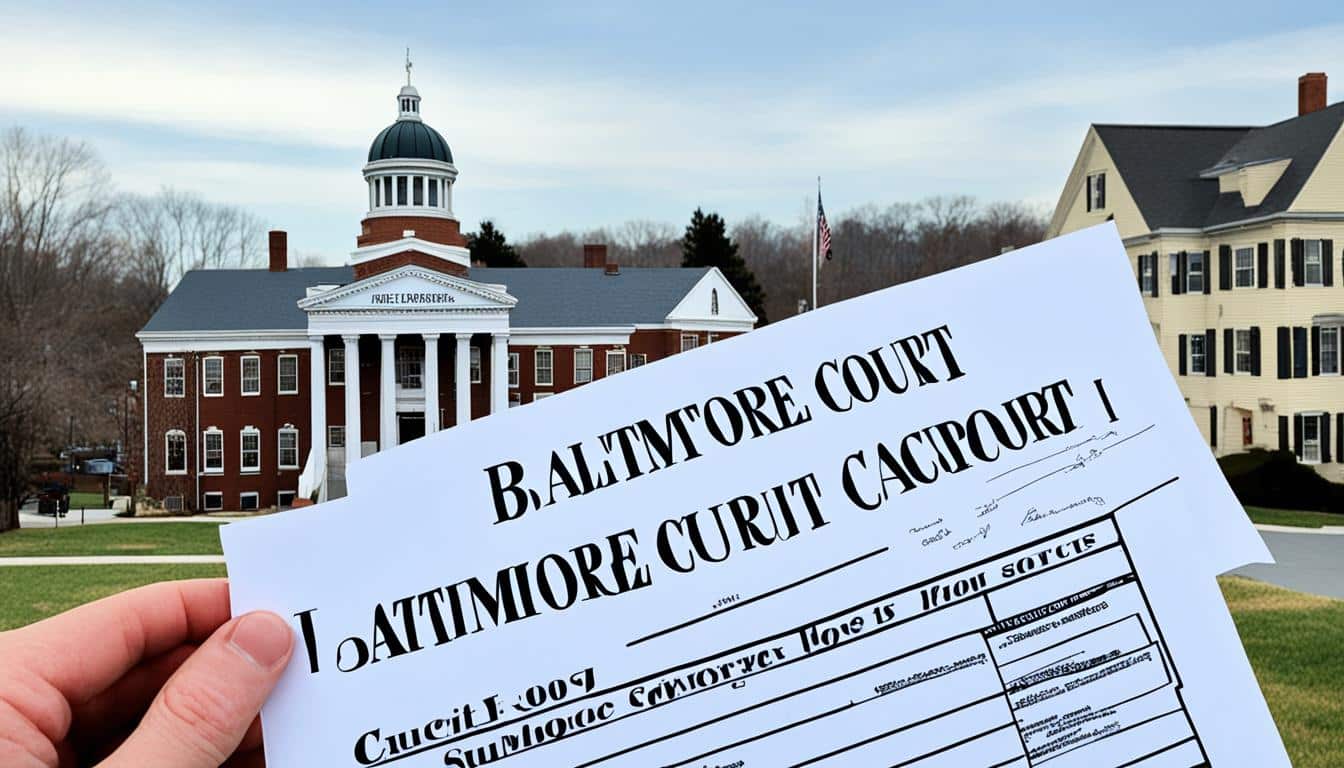Physical Address
304 North Cardinal St.
Dorchester Center, MA 02124
Physical Address
304 North Cardinal St.
Dorchester Center, MA 02124

Navigating the path of divorce in Baltimore County, MD, can feel like a maze. But you’re not alone. This guide is your flashlight, shining a light on each step you need to take.
From understanding legal requirements to filing the right paperwork, we’ve got you covered. Divorce is tough, but getting the facts shouldn’t be. Wondering where to start? Eager to understand the process? Keep reading.

We’ll walk you through the Baltimore County divorce process, making it as straightforward as possible. Let’s dive in and untangle the knots together.
To get more info on filing for divorce in Maryland, find a detailed overview in our article, How to File for Divorce in Maryland.
Before filing for divorce in Baltimore County, Maryland, it is important to understand the residency and jurisdictional requirements. In general, either you or your spouse must be a resident of Maryland to file for divorce in the state. However, specific requirements may vary based on the grounds for divorce and whether the divorce is contested or uncontested.
In order to file for divorce in Baltimore County MD, you must meet the following residency requirements:
It is important to note that residency requirements can vary depending on the specific circumstances of your case. If you are unsure about whether you meet the residency requirements, it is best to consult with a qualified divorce attorney in Maryland.
To establish jurisdiction, you must file your divorce case in the appropriate Maryland court. In Baltimore County, divorces are handled by the Circuit Court for Baltimore County. This is where you will need to file your divorce paperwork and where your case will be processed.
When filing for divorce in Baltimore County, Maryland, it is important to understand the grounds on which you can base your divorce. In Maryland, there are both no-fault and fault-based grounds for divorce. This section will explore the different grounds for divorce in Maryland, including the requirements and implications of each ground.
No-fault divorce is the most common route for divorcing couples in Maryland. The primary no-fault ground for divorce is separation, which requires that the spouses live separately and apart without cohabitation for a certain period of time, typically one year. This separation period must be continuous and uninterrupted, but it doesn’t necessitate obtaining a legal separation agreement.
By filing for a no-fault divorce based on separation, couples can avoid the need to prove fault or misconduct to dissolve their marriage. This can simplify the divorce process and reduce conflict between the parties involved.
In addition to no-fault grounds, Maryland also recognizes fault-based grounds for divorce. These grounds include:
When filing for divorce on fault-based grounds, it is necessary to provide evidence of the misconduct that led to the breakdown of the marriage. This can involve gathering documentation, witnesses, or other supporting evidence to present in court.
It’s important to consult with a qualified family law attorney to navigate the divorce process effectively and determine the most suitable grounds for your specific situation.
| Grounds for Divorce | Requirements | Implications |
|---|---|---|
| No-Fault Divorce based on Separation | Living separately and apart without cohabitation for a continuous period of time, typically one year | Simplifies the divorce process, eliminates the need to prove fault or misconduct |
| Adultery | Proving that the spouse engaged in sexual intercourse with someone other than their spouse | Can be used as grounds for divorce |
| Desertion | Voluntarily leaving the marital home without justification and the intention to end the marriage | Serves as a basis for divorce |
| Domestic Violence | Being subjected to abuse or domestic violence | Can be a basis for divorce in Maryland |
Filing for divorce in Baltimore County, Maryland involves several steps and requires the completion of specific forms. This section will provide a step-by-step guide to filing for divorce in Baltimore County MD, including information on where to obtain the necessary forms, how to complete them accurately, and the process of filing them with the appropriate court. Whether you choose to file for divorce yourself or seek assistance from an online divorce service, this guide will help you navigate the filing process effectively.
When filing for divorce in Baltimore County MD, it is important to follow the correct steps to ensure that your divorce is processed smoothly. Here is a step-by-step guide to help you through the process:
Filing for divorce in Baltimore County MD can be a complex process, but by following these step-by-step instructions, you can navigate the filing process with confidence. If you prefer a DIY approach, make sure to carefully complete all the necessary forms and adhere to the court’s requirements. Alternatively, you may consider utilizing the services of an online divorce service to assist you in preparing and filing your divorce paperwork.
Remember, divorces can have significant legal and financial implications, so it is always advisable to consult with an attorney or seek legal advice specific to your situation. By following the correct procedures and seeking appropriate assistance, you can ensure that your divorce process in Baltimore County MD proceeds as smoothly as possible.
When filing for divorce in Baltimore County, Maryland, it’s important to budget for the associated fees and costs. Understanding the financial implications of filing for divorce will help you plan your finances accordingly. In this section, we will provide you with information on the current filing fees in Baltimore County MD and offer insights into other potential costs that may arise during the divorce process.
Divorce filing fees in Baltimore County MD may vary depending on the specifics of your case and the court you file with. It is essential to familiarize yourself with the court fees for divorce to ensure you are financially prepared. Additionally, keep in mind that other expenses, such as attorney fees, mediation costs, and potential child custody evaluations, may be necessary depending on your situation.
To give you a general idea, here is a table summarizing the typical filing fees in Baltimore County MD:
| Fee Type | Cost | Description |
|---|---|---|
| Action – Individual without Attorney | $165.00 | Includes $80.00 Filing Fee, $55.00 MLSC Surcharge, and $30.00 Records Improvement Fund. Civil Actions include Adoptions, Divorce, Guardianship, Personal Injury, Mechanics Lien, Change of Name, Foreclosure, Lis Pendens, Condemnation, Miscellaneous, Confessed Judgments, Habeas Corpus, and Foreclosure. No Charge in Advance for Prayer for Jury Trial from District Court. |
| Action – Individual with Attorney | $185.00 | Same as above. |
| Action – Annual Fiduciary Report | $10.00 | Accounts up to $10,000 |
| Review Fee for Trust Clerk | $20.00 | Accounts $10,001 – $25,000 |
| Review Fee for Trust Clerk | $30.00 | Accounts over $25,000 |
It’s crucial to note that the table above is only a general representation of the filing fees in Baltimore County MD. The actual fees can vary, and additional costs may arise depending on the complexity of your case.
Being aware of the costs associated with filing for divorce will help you plan your budget and make informed decisions about your case. It’s essential to assess your financial situation and explore affordable divorce options. Remember, there are resources available such as online divorce services and fee waiver options that can help make the divorce process more accessible.
Individuals who are unable to afford the filing fees for divorce in Baltimore County, Maryland may be eligible for a fee waiver. This section will explore the fee waiver options available in Baltimore County MD, including the eligibility criteria and the process for obtaining a waiver. Understanding fee waiver options can help make divorce more accessible for individuals facing financial hardship.
The court is located at:
120 E Chesapeake Ave, Towson, MD 21286, United States
Filing for divorce without an attorney, also known as a pro se divorce, can be a viable option for individuals who want to handle the divorce process on their own. While it may seem daunting, with the right resources and guidance, you can successfully navigate the DIY divorce process in Baltimore County, MD.
One of the main benefits of filing without an attorney is cost savings. Hiring an attorney can be expensive, and by representing yourself, you can avoid these hefty fees. Additionally, filing for divorce pro se allows you to have more control over the process and decision-making, as you are not relying on a third party to advocate for your interests. It can also be a more expedited process, as you don’t have to coordinate schedules and communication with an attorney.
However, it is important to note that filing for divorce without an attorney does come with its challenges. You will need to familiarize yourself with the legal requirements and procedures involved in Maryland divorce cases. It is recommended to thoroughly research the specific laws and regulations in Baltimore County, MD, and seek guidance from reliable legal resources.
Fortunately, there are online divorce services available that can provide step-by-step guidance and assistance throughout the DIY divorce process. These services can help you understand the necessary forms, complete them accurately, and ensure you meet all the required deadlines. Additionally, they may offer additional resources such as legal advice and document review to help you navigate the complexities of the divorce process without an attorney.
By exploring self-representation in Baltimore County, MD, and utilizing the available online divorce services and legal resources, you can successfully file for divorce without an attorney. With proper preparation and knowledge, you can navigate the DIY divorce process confidently and efficiently.
To see how this process of filing for divorce in Baltimore County compares to that in other Maryland counties, check out our articles about how to file for divorce in Anne Arundel County and filing for divorce in Worcester County.